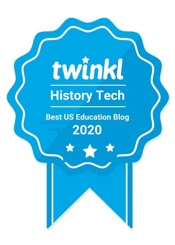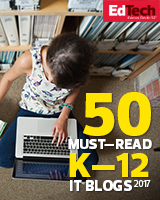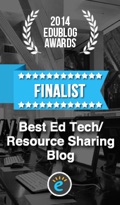Social studies in the age of Siri

Twenty years ago if I had asked a kid who the 16th president was, I would have likely gotten a blank stare and a shrug of the shoulders. Ditto with stuff like the capital of Idaho, when the 14th Amendment was passed, and where the Treaty of Versailles was signed.
The shrugging of shoulders was mostly my fault. I taught in a very traditional style, with my focus on basic content. This method encouraged the memorization of a few facts just long enough to pass the unit test.
I didn’t know any better – it was the way I was taught and it was the way I was taught to teach. In that sort of classroom, long term retention and actual application of knowledge just weren’t going to happen.
We know better now.
Realistic problems. Collaboration. Analyzing evidence. Creation of authentic products. Integration of fiction and non-fiction. Use of technology. Formative assessment.
This is 21st century social studies.
Several of us on the Kansas state social studies standards writing team met with the state Board of Education yesterday to share final thoughts and answer questions about the revised standards. The board seemed to like the document and we’re hoping for final approval in a month. I think the document will encourage high quality 21st century teaching and learning.
But as forward thinking as I believe the document to be, it could be better. I don’t think we focused enough on technology integration, specifically on how accessible foundational knowledge is for students to collect.
We needed to be more intentional about ways teachers can incorporate strategies that don’t just allow the use of search tools and other technology but that encourage and support their use. (Mmm . . . maybe in the supplementary materials?)
This is the age of Siri and instant access to information. We can’t simply ask questions or provide worksheets or lecture or ask kids to read the textbook anymore. A simple verbal question on a cell phone can pull up more data in a minute than we can supply in a class period.
Class discussions should incorporate the use of cell phones, tablets, and other devices to discover new and supporting materials. if they haven’t already, teachers need to make it clear that they don’t know everything about their subject and encourage kids to learn from many different sources.
All too often, we treat the collection of foundational knowledge as our primary purpose. Having the facts is just the beginning of what our kids should be doing.
We can ignore the brain research and turn a blind eye to technology. We can continue to teach the old way – lecturing and handing out worksheets, assigning chapters and questions from the textbook, and “measuring learning” with multiple choice tests.
And we’d be wasting everyone’s time.
Because with Siri and Google and Bing and Wikipedia, they already have the answers. Rather than limiting access to these sorts of tools, we need to help students use them better.
We need to go beyond collecting data to helping kids organize that data into patterns. We need to go beyond these patterns to helping kids understand what these patterns mean.
That is what learning in the 21st century looks like. Not just data collection. Knowledge creation.
Because now we really do know better.
















wonderful summary of the change that needs to happen.
Thanks for the comment!
glennw
I agree. I disagree. Worksheets that require students to read and glean information from the text are still important. While technology integration is also important, don’t assume it is always the best way. There is room for lecture. There is room for note taking. Every teacher of worth includes in her bag of methods a good balance of the old and new.
Carla,
I agree with your agreeing and disagreeing! My point is not that we don’t deliver, or expect kids not to know, foundational content. My concern is that if our entire focus is on the dissemination of content, we’re wasting both our time and the time of our kids. We need to move beyond simple collection of data to training kids to actually do something with the data. And if we can incorporate technology to collect the data faster so that we can get to the analysis and meaning of the data, we should.
I still see many teachers getting upset because kids have used Google or Wikipedia or Siri to fill in worksheets (that are graded – which is a whole other story!) and think that the kids have “cheated.” They get upset because the teacher sees the worksheet as the end of the activity, not the beginning.
Nothing wrong with an effective lecture or a graphic organizer used to collect data but we need to move past the belief that if all we do is lecture and worksheets, then we have done our job and done it well.
Thanks for the comment!
glennw
Love this article Glenn! Definitely going to share it with my entire dept! Thanks!
Scott,
Glad you enjoyed it! Would be curious to hear what others think of it.
glennw
I agree and disagree like others. It would be a wonderful world where we could have students create projects and teach them how to disseminate information. Everything is at their fingertips (literally), but they still need to understand the feelings (Historical Empathy) of those that came before. I believe for that to occur a teacher will have to lecture(Tell the stories), students will have to take notes sometimes complete a worksheet from a lecture or movie. I believe there is a place for all of it. Oh, and do not forget we still have to get them to remember facts for testing.
Michael,
Thanks for the comment! The good news in Kansas is that we’re moving back to a performance assessment at the state level – so less focus on discrete facts for the test. But I agree, foundational knowledge is important. I just don’t want it to be the end in mind. I see too many teachers who believe they’re doing a great job because they “covered” Chapter 1 to Chapter 47 in one semester.
We need to find the balance between content and process – and if technology can help us spend less time on collecting the content and more time on processing / using the content, I’m all in.
glennw
Great article Glenn! I agree that knowledge creation is key – once the knowledge foundation is built. I think we also have a responsibility as educators to teach our students appropriate ways to interact with technology. The more we are comfortable with students using technology in our classrooms, the better we can assist them with moving past the quick Google search or Wikipedia find. We can teach them academic ways to filter through the information they are slammed with on the spot in an efficient and effective/relevant manner. This skill will help students quickly build foundation knowledge so that then we can guide them into the creation phase. Again, loved the article and the fact that you continue to raise the bar for educators.
Shanna,
Thanks for the comment! I agree – we need to help kids use technology appropriately and effectively. And as social studies teachers – with as much content that are responsible for – the better they are at collecting and organizing, the sooner we can get on with the fun stuff of creation.
glennw